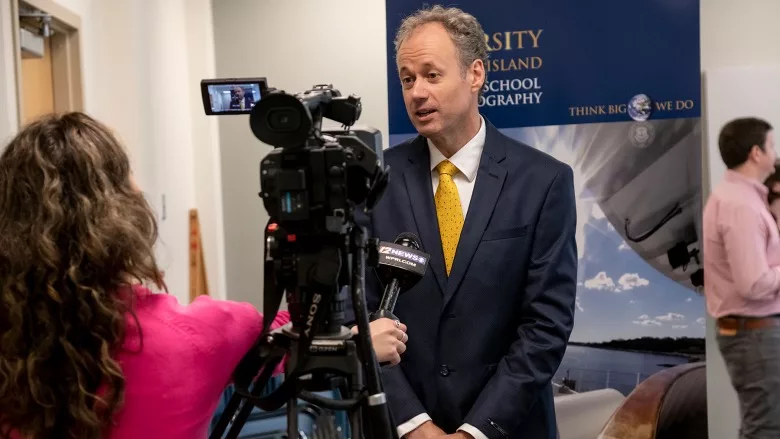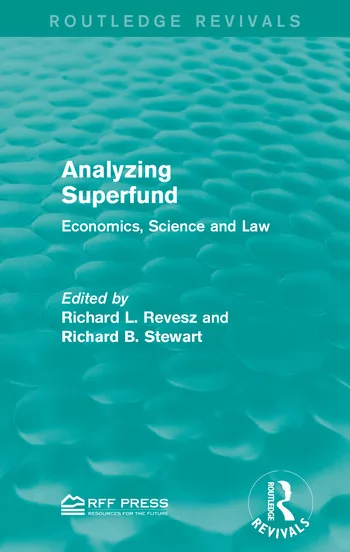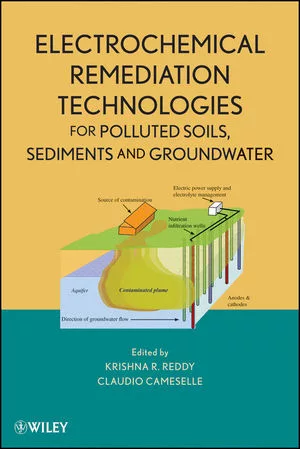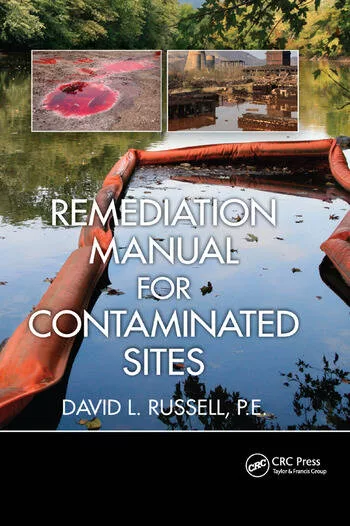Rhode Island Superfund research center renewed for another 5 years
A renewal of $8.1 million comes from the National Institutes of Health for another 5 years of research at University of Rhode Island.

URI Professor of Chemical Oceanography Rainer Lohmann, chief researcher on the STEEP project, answers questions during an interview with Channel 12 reporter Dana Casullo. URI photo by Michael Salerno Photography
Against the backdrop of a new federal undertaking to address PFAS pollution, a University of Rhode Island-based PFAS research-and-outreach program has been renewed by the government for another five years. The STEEP (Sources, Transport, Exposure and Effects of Per- and polyfluorinated alkyl Contaminants) program, one of the longer running PFAS science efforts in the country, studies pollution and examines potential research-based solutions alongside community partners.
Rhode Island elected officials and University leaders joined scientists today at the Providence headquarters of Rhode Island’s Department of Environmental Management to announce the $8.1 million, 5-year grant renewal by the National Institute of Environmental Health Sciences, a division of the National Institutes of Health.
“Renewal of critical funding for STEEP has implications reaching far beyond URI. Now ubiquitous in everyday items we use and wear, PFAS have emerged as high-priority contaminants with devastating impacts to humans and the environment,” says URI President Marc Parlange. “Fortunately, URI, with our STEEP partners, is uncovering just how detrimental these forever chemicals are, providing the research, data, and tools to better understand and mitigate the dangers to Rhode Island residents and beyond. Renewed funding of this essential program ensures that we can continue to inform policies that remove PFAS from our lives while analyzing the potential harm of new chemicals before they are released into the environment.”
The president also says that approval of the $100 million bond question on the Nov. 8 ballot will lead to enhanced and expanded facilities at URI’s Narragansett Bay Campus, where the STEEP program is based. It is essential to the continued success of the STEEP initiative and other research at the campus that focus on the health and well-being of Rhode Islanders and the environment.
“So I just want to remind everyone here to vote yes on question 1,” Parlange says.
“This is good news on two fronts,” says Rainer Lohmann, chief researcher on the STEEP project and a URI Graduate School of Oceanography chemical oceanographer. “Program renewal means STEEP can continue to produce the solid science needed to respond to PFAS problems, while the latest round of federal actions and support for PFAS treatment helps affected communities receive clean drinking water.”
The recently launched federal Environmental Protection Agency PFAS program reflects the latest science, including STEEP findings, that there is no safe level for many of the chemicals and their intake ought to be reduced as much as possible. The program provides states with guidance for protecting key resources, like drinking water, and with money – $1 billion is available nationally – for planning or implementing either mitigation or prevention actions.
STEEP is also informing Rhode Island decision-making, with the state recently banning PFAS from food contact materials – coated cardboard pizza boxes, for instance – and mandating that its Department of Health institute PFAS drinking water limits. PFAS chemicals are manmade and, while colorless and odorless, are tied to cancer, hormone disruption, and other tissue abnormalities, in humans and animals. They can be found in water-repellent outerwear and shoes, stain-guarded carpets and couches, many kinds of nonstick cookware, microelectronics, and items like coated microwave popcorn bags.
Lohmann’s team includes researchers who bring PFAS expertise in varied areas. “We need to be able to protect people from these insidious chemicals, especially children – and even before they are born,” says STEEP co-lead and researcher Philippe Grandjean, of the URI College of Pharmacy, who studies PFAS in children of the Faroe Islands. “Our project renewal will ensure that we can focus on vulnerable populations, especially children, to ensure that health risks from PFAS exposure are minimized.”
Likewise, “longer term efforts like STEEP enable scientific advances that provide essential information for regulatory decisions and risk management, “says STEEP researcher Elsie Sunderland, of Harvard University, who studies PFAS transport and transformation on Cape Cod, Massachusetts and elsewhere.
The renewal of the STEEP project means that the work taking place to study PFAS impacts in the Faroe Islands and on Cape Cod can continue, as will research and outreach projects that engage scientists, government decision-makers, the private sector, and communities in conversation and action about addressing PFAS collaboratively.
“Not only will this allow us to continue our work on Cape Cod to protect water quality, but also it will help us better understand possible exposures to PFAS from fish and other local sources and to apply what we’ve learned over the past five years to other communities that have been impacted by PFAS,” says STEEP researcher Laurel Schaider, a senior scientist at Silent Spring Institute.
Examples of STEEP’s recent outreach activities: Technical assistance to Rhode Island state officials as they apply federal guidance to develop PFAS monitoring plans for drinking water, and coordination of regional dialogue with other states about moving PFAS abatement actions within the manufacturing sector.
“Like climate change, this is a problem that we, as a global community, are going to be facing for generations to come,” says URI Coastal Institute Director Elin Torell. “Science and community engagement are critical to addressing PFAS, and our STEEP program, through its recertification, is providing both.”
The URI STEEP Superfund Research Program is a partnership of the URI Coastal Institute, Harvard University, and Silent Spring Institute, an independent scientific research organization that has been studying PFAS in drinking water on Cape Cod for more than a decade. Beyond the URI Graduate School of Oceanography and the Coastal Institute, additional URI groups involved in the project are the College of Pharmacy, College of the Environment and Life Sciences, its Department of Marine Affairs; and the College of Arts and Sciences, and its Harrington School of Communication and Media.
Research reported in this press release was supported by the National Institute of Environmental Health Sciences under Award Number P42ES027706. The content is solely the responsibility of the authors and does not necessarily represent the official views of the National Institute Of Environmental Health Sciences.
To learn more about STEEP and its renewal, visit the website at https://web.uri.edu/steep/. You can also contact Wendy Lucht, URI SRP STEEP Coordinator, wlucht@uri.edu, (401) 874-6212
Compilation of leadership perspectives on the 2022 STEEP renewal
The renewal of the STEEP initiative is broadly supported by an array of local leaders who share their perspectives on the effort to address PFAS pollution:
Rhode Island Gov. Daniel McKee: “The STEEP program at the University of Rhode Island is a true Rhode Island success story, and one that we are proud of across our 39 cities and towns,” McKee says. “Renewing this program for another five years provides URI with more opportunities to research these dangerous toxic chemicals and what can be done to ensure Rhode Islanders are kept safe now and into the future. I’m proud that this program has called Rhode Island home and even more proud that the work will continue.”
U.S. Sen. Jack Reed, a member of the Appropriations subcommittee that oversees this federal funding stated: “PFAS forever chemicals have spread globally through the ocean and atmosphere and pose a serious health threat. URI is a leader in marine research and the STEEP program’s work enhances scientific understanding of the bioaccumulation of PFAS in humans, animals, and the environment. I worked to support the original grant and this renewal of federal funding means URI can continue critical research that will help PFAS mitigation and pollution prevention.”
U.S. Sen. Sheldon Whitehouse: “Our work in environmental protection has shown how PFAS pose a serious public health threat to communities in Rhode Island and across the country. Researchers at the University of Rhode Island have led the way in understanding and mitigating the dangers of PFAS for a long time, and I am very glad the STEEP program has been renewed so they can continue this important work to protect Rhode Islanders.”
U.S. Rep. Jim Langevin: “The work that we do in Congress to limit PFAS chemicals and support affected communities depends on the data and research being done by programs like STEEP. If we are going to create laws to protect our children from these toxic chemicals, we must know where they’re most prevalent and what regulations will be most effective to eliminate them. The University of Rhode Island has been integral to that process, and I’m thrilled that this program will remain funded for years to come.”
U.S. Rep. David Cicilline: “It’s great news that URI’s STEEP program is receiving renewed federal funding. This investment will allow the program to continue its critical work examining the impacts of PFAS and identifying ways to address this pollutant. Years of mounting research, like that from STEEP, have helped us learn about the serious health risks of PFAS, and ongoing study will help direct government interventions to minimize exposure. Congrats to URI and all of the researchers involved.”
Terrence Gray, director of the Rhode Island Department of Environmental Management: “The researchers in the STEEP program have done excellent work to increase awareness of the environmental and public health issues related to PFAS here in Rhode Island. Dr. Lohmann and all the other people on the STEEP team have also done excellent work on innovative devices and methods to sample for these contaminants in the environment. With the passage of comprehensive PFAS legislation by the Rhode Island General Assembly in June, we expect a heightened attention to, and regulation of, these ‘forever chemicals’ and look forward to continuing to work closely with the STEEP team at URI funded by this grant renewal.”






